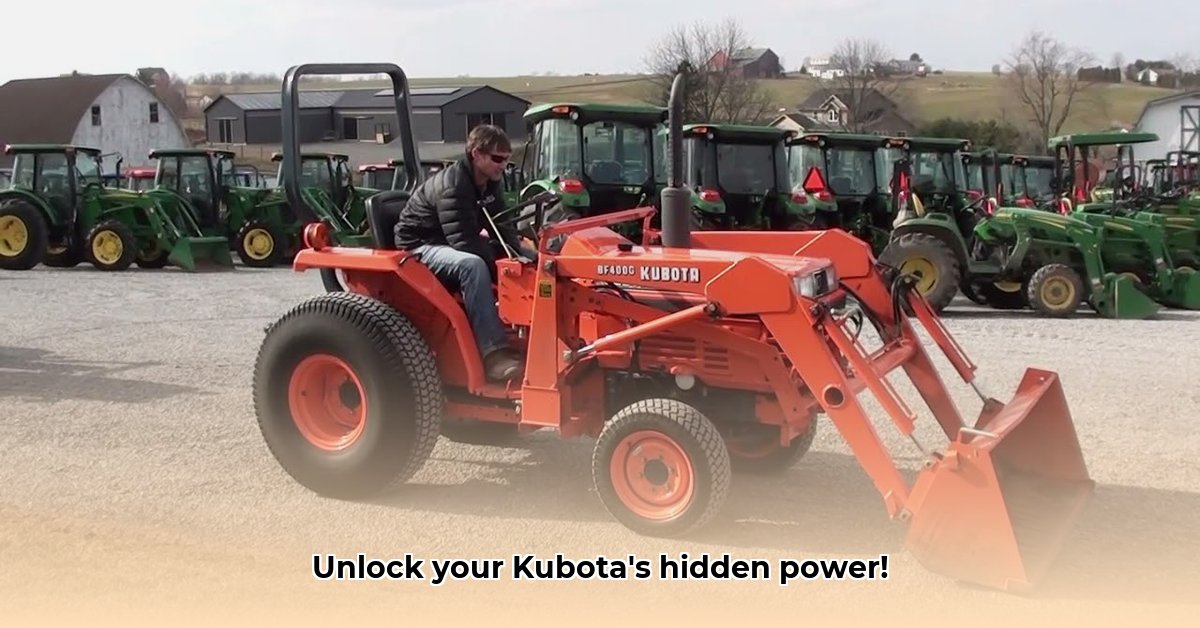
Older Kubota Tractor: A Legacy of Reliability and Sustainable Farming
Imagine a seasoned farmer, weathered by years of sun and sweat, leaning against his trusty Kubota tractor – not a gleaming new model, but a seasoned veteran that's seen countless harvests. This isn't just a machine; it's a partner, a testament to Kubota's renowned durability. This older Kubota, maybe a bit rusty but still strong, represents a piece of farming history and a story of dependability that resonates with generations. But how does this dependable workhorse fit into modern sustainable farming practices? This article explores the enduring legacy of older Kubota tractors, their evolution, and how they can contribute to a greener future. Learn more about Kubota tractor regeneration here.
From Humble Beginnings to Global Powerhouse
Kubota's journey began in Japan, crafting compact tractors perfect for the country's smaller farms. These early models, though small by today's standards, were revolutionary, offering impressive efficiency and maneuverability in tight spaces where larger tractors struggled. Early models like the L13G (a compact 13 horsepower tractor) showcased Kubota's focus on reliability and performance. This focus on compact design, even in early models, foreshadowed a key aspect of their contribution to sustainability. Later models, such as the M9570 (a powerful 95 horsepower tractor), demonstrated significant advancements in engine power and capabilities, expanding their application across diverse farming operations. This evolution highlights Kubota's consistent dedication to improving both power and efficiency. How did this evolution impact fuel consumption and overall environmental impact? Let's explore that further.
Power and Efficiency: A Symbiotic Relationship
The transition from smaller, lower-horsepower tractors to larger, more powerful models signifies a substantial leap in agricultural efficiency. It's not just about raw power; it's about smarter engineering. Improvements in engine design (such as the shift from mechanical to electronic fuel injection) and transmissions translated to more work completed in less time, leading to greater yields and reduced operational costs. This increased efficiency directly impacts sustainability. By minimizing the time required to complete tasks, fuel consumption – and consequently, the carbon footprint – is also minimized. This creates a beneficial cycle where improved efficiency translates into both economic and environmental advantages. Consider, for instance, the reduced fuel consumption per acre farmed – a significant factor in sustainable agriculture.
Sustainability: A Legacy Built to Last
While detailed sustainability data for early Kubota models is limited, their inherent design features contribute significantly to sustainable farming practices. The compact size of older Kubota tractors, compared to larger modern models, likely resulted in lower fuel consumption per acre. Furthermore, their exceptional longevity, as evidenced by the decades of service many have provided, drastically reduces the need for frequent replacements. This minimizes manufacturing waste, resource consumption, and the overall carbon footprint associated with tractor production and disposal. The long lifespan of a well-maintained Kubota represents a significant environmental advantage. How does the durability of these machines translate into a smaller ecological footprint compared to newer tractors requiring more frequent replacements? This is a crucial consideration for modern sustainable farming.
Modernizing the Past: Boosting Sustainability with Technology
Even older Kubota tractors can be significantly enhanced with modern technological upgrades. Integrating precision farming tools, such as GPS-guided planting and spraying systems, optimizes fuel use, minimizes resource waste (like fertilizer and pesticides), and drastically improves overall sustainability performance. This “retrofit” approach allows farmers to leverage the reliability of their existing machines while adopting modern, sustainable practices, extending the lifespan and eco-friendliness of these older models. This strategy allows for a balanced approach to sustainability and cost efficiency. What kind of return on investment can a farmer expect by updating an older Kubota with precision farming technology? A detailed cost-benefit analysis exploring this potential would be valuable for farmers considering such modernization.
Maintaining the Machine: Extending the Life Cycle
Proper maintenance is paramount in maximizing the lifespan and efficiency of your older Kubota. Regular maintenance, including timely oil changes, filter replacements, and prompt addressing of mechanical issues, is crucial. These small steps significantly contribute to the machine's longevity and help prevent costly repairs down the line. A well-maintained older tractor can operate just as efficiently as a newer one, reducing your need for a costly replacement and minimizing the environmental impact associated with manufacturing a new machine. What are the most crucial maintenance steps to ensure the extended lifespan of an older Kubota tractor? A detailed checklist would be a valuable resource for farmers.
A Future of Farming: Honoring the Past, Embracing the Future
Older Kubota tractors represent more than just powerful machines; they embody resilience, longevity, and a commitment to efficient farming. While comprehensive historical data on their environmental impact may be scarce, their long lifespan and compact design strongly suggest a positive contribution to sustainable agriculture. By pairing the reliability of these older tractors with modern technology, we can create a farming future that respects both efficiency and the environment. The legacy of these machines demonstrates the value of mindful engineering and the enduring need for effective, sustainable solutions. The future of sustainable farming hinges on integrating the best of both worlds – proven reliability and technological innovation. What steps can farmers take to further reduce the environmental impact of their operations, even with older equipment? This is a question that deserves further investigation.
How to Reduce Environmental Impact of Kubota Tractors
Key Takeaways:
- Older Kubota tractors offer inherent environmental advantages due to their compact size and longevity, despite limited specific sustainability data.
- Modernizing older models with precision farming technology significantly reduces fuel consumption and resource waste.
- Kubota's ongoing commitment to sustainable practices points towards a future focused on minimizing environmental impact.
- Further research is needed to fully quantify the historical environmental impact of older Kubota tractor models.